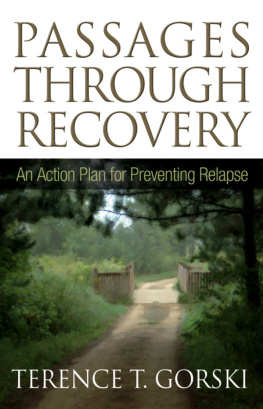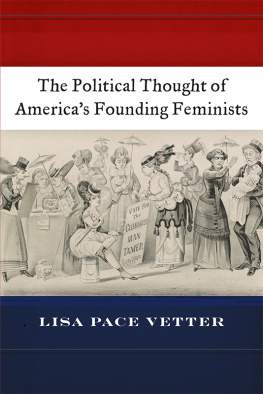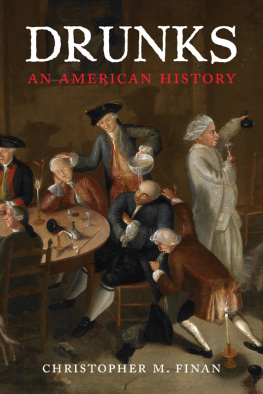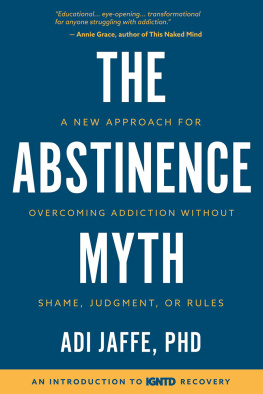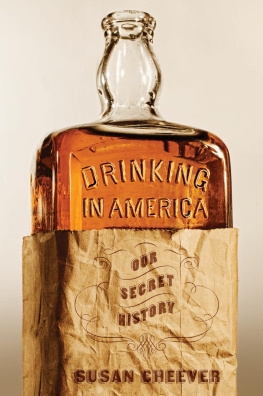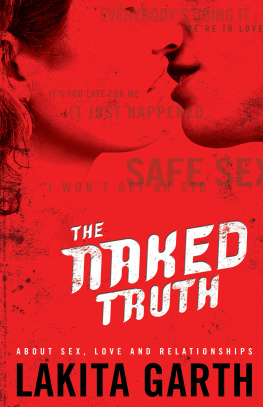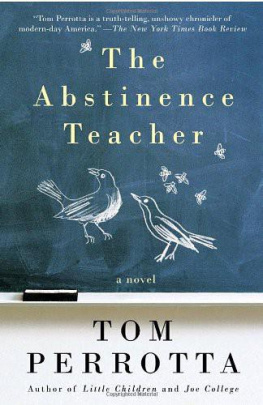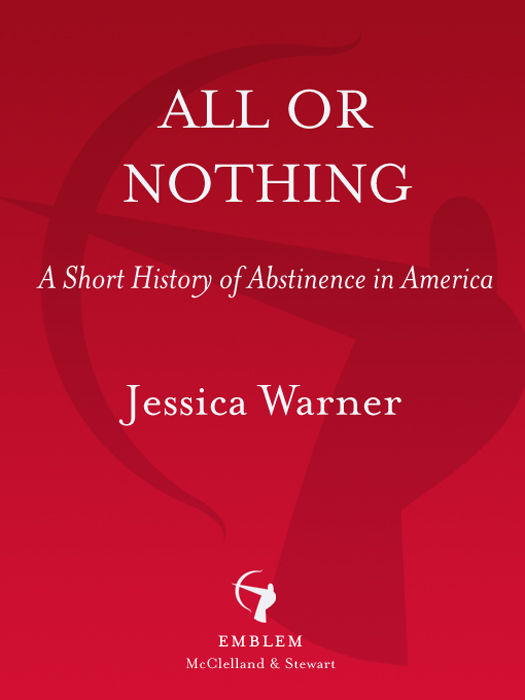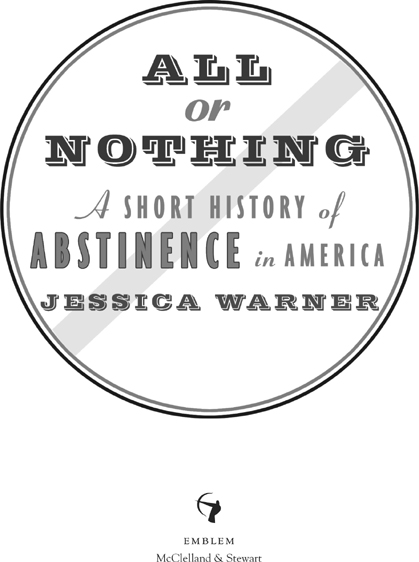CONTENTS
INTRODUCTION
The Logic of Abstinence
ONE
The Evangelical Premise
TWO
How Moderation Became a Vice
THREE
Sylvester Graham, Vegetarianism, and the Pursuit of Perfect Temperance
FOUR
Abstinence without Idealism
FIVE
John Stuart Mill and the British Alternative
EPILOGUE
From Abstinences Past to Its Present
PREFACE
Seventy, it wont make it,
Eighty, God wont take it,
Ninety, thats close,
Ninety-nine and a half is almost,
But get your hundred,
Ninety-nine and a half wont do.
Ninety-Nine and a Half,
as recorded by Dorothy Love Coates
and the Original Gospel Harmonettes, circa 1950
I n 1986, on his fortieth birthday, George W. Bush suddenly stopped drinking. He refused to go into the reasons behind his decision, other than to allude to boyish pranks and glancing brushes with the law. What he did not mention was that he had been arrested on at least two occasions for disorderly conduct in 1966, and for driving under the influence of alcohol in 1976.
The truth was that Bushs decision had little to do with his drinking. It came just as he was starting to identify himself as an As president of the United States, he would preside over a vast increase in federal funding for abstinence-only sex education, with expenditures peaking at US$176 million in 2007.
My goal in writing this book is to explore why abstinence is so important to evangelicals like George W. Bush. The implications would be minimal if abstinence were a private virtue and nothing more. But as Bushs example makes all too clear, the tendency in American history has been for abstinence to spill over into the public sphere. Temperance began as a voluntary movement and ended with Prohibition. The sexual purity movement of the late nineteenth and early twentieth centuries led to legislation that made it illegal to transport females across state lines for immoral purposes (the Mann Act). The New Virginity, an evangelical movement spearheaded by the Southern Baptist Convention, has shaded into the use of federal tax dollars to pressure public schools into teaching abstinence-only sex education.
The New Virginity is by its very nature a missionary movement, with outposts in Britain and sub-Saharan Africa.
The problems these movements propose to solve vary, but the underlying principle, that the only safe response to risk is to eliminate it altogether, has remained remarkably constant. That there have been so many of these movements, and that they keep returning to the same solution, suggests that the time has come to take a closer look at the religious ideal they share.
By abstinence I mean a principled and unerring refusal to engage in a particular activity. Going without something for a short period of time is not abstinence. The person who gives up meat on Fridays is not giving up meat per se; that person is simply giving up meat once a week. The abstainer is driven by an entirely different logic: if something is problematic on some occasions, then it is problematic on all occasions. Anything short of total victory is a form of defeat.
The concept is simple, but its implications are both complex and far-reaching, affecting how Americans think about their health and their indulgences and how their government promotes the first and regulates the second. Nor does the idea show any sign of fading. On the contrary. Most Americans (79.2 per cent) do not smoke. A large minority (38.9 per cent) do not drink. Nine million (an estimated 3 per cent) do not eat meat.
Almost all continue to believe in premarital chastity.
The doctrine that guides their actions has gone by any number of names over the years Christian perfection, sanctification, holiness, the second blessing. Its core teaching, that the Christian can conquer sin, is an article of faith among evangelical Protestants. Where they have differed is in how they define sin. The trend has been for that definition to contract over time, and with it, the number of things Americans are willing to give up. The ends abstinence serves have also undergone a startling transformation. Once the handmaiden of feminists such as Susan B. Anthony and abolitionists such as William Lloyd Garrison, abstinence today is primarily associated with conservative evangelicals, with people like James Dobson, Tim LaHaye, and, of course, George W. Bush.
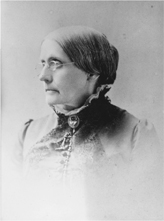
Susan B. Anthony, the greatest of Americas suffragists, began her career as a temperance organizer in 1852. Like so many other feminists of her generation, Anthony was also a big believer in sexual purity, writing, in 1875, that Fathers should be most particular about the men who visit their daughters, and, to further this reform, pure women not only must refuse to meet intimately and to marry impure men, but, finding themselves deceived in their husband, they must refuse to continue in the marriage relation with them. From the Library of Congress Prints and Photographs Division.
The challenge for the historian is twofold: first, to explain why the concept has migrated from one end of the political spectrum to the other, becoming, in the process, a protest against change rather than a force for it; second, to give abstinence its due place in the history of ideas. Abstinence, of course, is not like any other idea. It admits of no gradations, no competing schools of thought, no changes over time in short, it has none of the features historians look for when they write about ideas. What can be studied are the ends this particular idea has served, and that is why this is as much a book about abstinence as it is an essay on evangelicals and how they see the world.
The question of whether abstinence is good, bad, or in-different I leave to the reader. But I am convinced that no purpose is served by dismissing the concept out of hand. To do this is to write Americas history as H.L. Mencken might have, as a series of unfortunate exchanges between yokels and sophisticates. It also misreads the way ideas work. Ideas that are If abstinence were one of those ideas, if it were a pointless exercise in Grundyism, it would never have gained the ascendancy it has over the American imagination.
INTRODUCTION
THE LOGIC OF ABSTINENCE
We wish every family a part
To understand the healing art,
Without so many forms and rules
Coined and packaged by the schools.
Samuel Thomson ( 17691843 )
I deas that persist over time, that have mass appeal, that transcend the barriers of race, class, and ideology, are usually taken seriously by intellectuals. Not so for abstinence in America. Its attractions are obvious to the millions who believe in it. But to the millions who do not, the very word conjures up everything Blue America dislikes about Red America its intense religiosity, its rejection of the sexual revolution, its refusal to be more like Europe. The assumption is that abstinence is a joyless exercise in self-denial, one that could appeal only to the most crabbed and intolerant of religious conservatives.
Two facts stand in the way of this easy interpretation. The first is that the religious right does not have a monopoly on abstinence. In the case of America, the association between social conservatism and abstinence is in fact recent, dating from the


